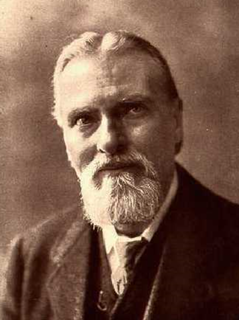A Quote by Charles Darwin
I am aware that the assumed instinctive belief in God has been used by many persons as an argument for his existence. The idea of a universal and beneficent Creator does not seem to arise in the mind of man, until he has been elevated by long-continued culture.
Related Quotes
The assumed instinctive belief in God has been used by many persons as an argument for his existence. But this is a rash argument, as we should thus be compelled to believe in the existence of many cruel and malignant spirits, only a little more powerful than man; for the belief in them is far more general than in a beneficent deity.
On a long flight, after periods of crisis and many hours of fatigue, mind and body may become disunited until at times they seem completely different elements, as though the body were only a home with which the mind has been associated but by no means bound. Consciousness grows independent of the ordinary senses. You see without assistance from the eyes, over distances beyond the visual horizon. There are moments when existence appears independent even of the mind. The importance of physical desire and immediate surroundings is submerged in the apprehension of universal values.
He thought about science, about faith, about man. he thought about how every culture, in every country, in every time, had always shared one thing. We all had the Creator. We used different names, different faces, and different prayers, but God was the universal constant for man. God was the symbol we all shared...the symbol of all the mysteries of life that we could not understand. The ancients had praised God as a symbol of our limitless human potential, but that ancient symbol had been lost over time. Until now.
Is a Christian- one who communicates daily with the Creator- to divorce himself from the things God created and intended man to have, and which demonstrate the fact that man has been made in the image of God? In other words, are we who have been made in the image of our creator to be less creative than those who do not know the Creator? The Christian should have more vividly expressed creativity in his daily life.
Know that the difficulties which lead to confusion in the question what is the purpose of the Universe or of any of its parts, arise from two causes: first, man has an erroneous idea of himself, and believes that the whole world exists only for his sake; secondly, he is ignorant both about the nature of the sublunary world, and about the Creator's intention to give existence to all beings whose existence is possible, because existence is undoubtedly good.
Atheists are often charged with blasphemy, but it is a crime they cannot commit... When the Atheist examines, denounces, or satirises the gods, he is not dealing with persons but with ideas. He is incapable of insulting God, for he does not admit the existence of any such being... We attack not a person but a belief, not a binge but an idea, not a fact but a fancy.
The theoretical idea ... does not arise apart from and independent of experience; nor can it be derived from experience by a purely logical procedure. It is produced by a creative act. Once a theoretical idea has been acquired, one does well to hold fast to it until it leads to an untenable conclusion.
His [Turgot's] first important literary and scholastic effort was a treatise On the Existence of God. Few fragments of it remain, but we are helped to understand him when we learn that he asserted, and to the end of his life maintained, his belief in an Almighty Creator and Upholder of the Universe. It did, indeed, at a later period suit the purposes of his enemies, exasperated by his tolerant spirit and his reforming plans, to proclaim him an atheist; but that sort of charge has been the commonest of missiles against troublesome thinkers in all times.
I am not an ape, I am a man. The world has been created by God. Man has been created by God. It is not possible for man to understand God - God understands God. Man is God and therefore understands God. I am God. I am a man. I am good and not a beast. I am an animal with reason. I have flesh, I *am* flesh, I am not descended from flesh. Flesh is created by God. I am God. I am God. I am God.
If you have a belief and you come against an experience which the belief says is not possible, or, the experience is such that you have to drop the belief, what are you going to choose — the belief or the experience? The tendency of the mind is to choose the belief, to forget about the experience. That’s how you have been missing many opportunities when God has knocked at your door.
The idea that a good God would send people to a burning hell is utterly damnable to me. I don't want to have anything to do with such a God. But while I cannot conceive of such a God, I do recognize the existence of a great universal power - a power which we cannot even begin to comprehend and might as well not attempt to. It may be a conscious mind, or it may not. I don't know. As a scientist I should like to know, but as a man, I am not so vitally concerned.
A Buddha is not a man of concentration, he is a man of awareness. He has not been trying to narrow down his consciousness; on the contrary, he has been trying to drop all barriers so that he becomes totally available to existence. Watch... existence is simultaneous. I am speaking here and the traffic noise is simultaneous. The train, the birds the wind blowing through the trees - in this moment the whole of existence converges. You listening to me, I speaking to you, and millions of things going on - it is tremendously rich.
It is commonly said that if rational argument is so seldom the cause of conviction, philosophical apologists must largely be wasting their shot. The premise is true, but the conclusion does not follow. For though argument does not create conviction, the lack of it destroys belief. What seems to be proved may not be embraced; but what no one shows the ability to defend is quickly abandoned. Rational argument does not create belief, but it maintains a climate in which belief may flourish.


































